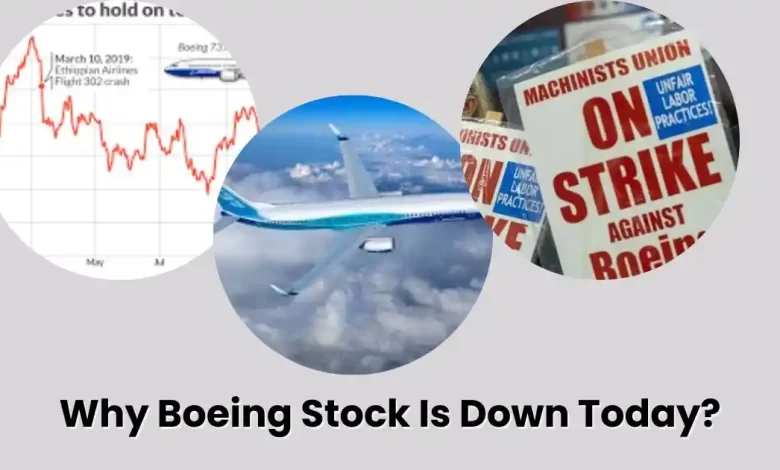Why Boeing Stock Is Down Today? A Deep Dive into Boeing’s Recent Struggles

Why Boeing Stock Is Down Today? Boeing, one of the most iconic names in the aerospace industry, has recently faced a sharp decline in its stock price. The company’s once-unshakable reputation has taken a hit, with a series of events unfolding that have led investors and industry insiders to question its long-term stability. The primary reason for Boeing’s stock drop today stems from a significant labor strike, triggered by workers’ rejection of a proposed deal between union representatives and the company. This strike, however, is just the latest in a series of troubles that have plagued Boeing in recent years.
Union Strike: The Immediate Cause
More than 30,000 Boeing workers across Seattle and Portland initiated a strike after overwhelmingly rejecting a tentative agreement that offered a 25% pay increase over four years. Despite the substantial pay raise, the workers voted against the deal, demanding better terms and expressing frustration with the company’s management. Almost 95% of the workers rejected the proposal, and 96% of them backed strike action until a new agreement is reached.
This rejection and subsequent strike have had an immediate impact on Boeing’s operations. Workers involved in the strike produce key aircraft models, including the 737 Max and the 777. With production coming to a halt, the company faces significant disruptions that could last for weeks or even months. Analysts have warned that an extended strike could cost Boeing billions of dollars, as the company’s supply chain and production timelines are severely affected.
Historical Context: Boeing’s Labor Issues
Labour strikes are not new to Boeing. In fact, the company experienced a similar situation in 2008 when a strike lasted for eight weeks, costing the company approximately $1.5 billion per month. The current situation is even more precarious, as Boeing is grappling with deeper financial and reputational challenges than it faced over a decade ago. The 2008 strike also resulted in a contract that was extended in 2014, but that agreement expired recently, leading to the present crisis.
Loss of Trust Between Boeing and Workers
The breakdown in negotiations points to a deeper issue—a loss of trust between Boeing’s management and its workforce. The union had presented the 25% pay increase as one of the best deals they had ever negotiated, and yet the workers rejected it, signalling that the gap between management’s offers and the workers’ expectations is wide. The workers’ demand for a 40% pay rise and concerns over job security have fueled this dissatisfaction.
Adding to the complications, Boeing had promised that if the workers accepted the agreement, the company would commit to building its next commercial plane in the Seattle area. However, workers remain sceptical, given the company’s track record and ongoing issues with leadership changes and operational problems.
Boeing’s New CEO Faces a Steep Challenge
The strike is a significant blow to Boeing’s new CEO, Kelly Ortberg, who took over the role just a month ago. Ortberg inherited a company already mired in financial losses and safety scandals, and this strike adds a new layer of complexity to his efforts to turn the company around.
Ortberg had made a final plea to workers before the vote, urging them to accept the deal and warning that a strike would jeopardize Boeing’s recovery. However, this plea fell on deaf ears, and the strike went ahead. The situation now puts pressure on Ortberg to quickly resolve the impasse with the union and restore normal operations, but given the scope of the disagreement, this is no easy task.
Boeing’s Legal and Financial Woes
In addition to the labour strike, Boeing is grappling with significant legal and financial challenges. Earlier this year, the company agreed to plead guilty to a fraud charge and paid a hefty fine of $244 million in connection with the fatal crashes of two 737 Max planes. These crashes, which occurred more than five years ago, have haunted Boeing and contributed to the loss of trust in the brand.
The safety issues with the 737 Max models have not only led to legal troubles but have also caused Boeing to scale back production due to stricter oversight from the U.S. Federal Aviation Administration (FAA). The production cap imposed by the FAA has slowed down Boeing’s assembly lines, further hindering its ability to recover financially.
Impact on Boeing’s Stock Price
All of these factors—the strike, legal challenges, safety concerns, and management instability—have weighed heavily on Boeing’s stock price. Investors are concerned about the long-term viability of the company, especially given that it continues to face mounting financial losses. The prolonged nature of the strike could further exacerbate these issues, as analysts predict that Boeing could lose billions if the situation is not resolved quickly.
Additionally, airline customers are closely watching the strike. Airlines with outstanding orders for the 737 Max are worried about delays in delivery, which could disrupt their own operations. This adds pressure on Boeing to resolve the strike as quickly as possible, but with no resolution in sight, the uncertainty is causing further anxiety among stakeholders.
What Lies Ahead for Boeing?
The road to recovery for Boeing is filled with obstacles. The company is facing one of the most challenging periods in its history, and the current labour strike is just the latest setback in a long list of problems. Resolving the strike will require Boeing to rebuild trust with its workers, but that will likely require the company to make significant concessions.
Read More: Who is Kelly Ortberg Boeing?
In the long run, Boeing will also need to address its broader challenges—from repairing its reputation following the 737 Max disasters to stabilizing its financial performance. The company’s leadership will need to focus on strengthening internal relationships, improving safety protocols, and restoring investor confidence.
For now, the future remains uncertain. The longer the strike lasts, the more damage will be done to Boeing’s bottom line and reputation, making it increasingly difficult for the company to recover in the near term.



